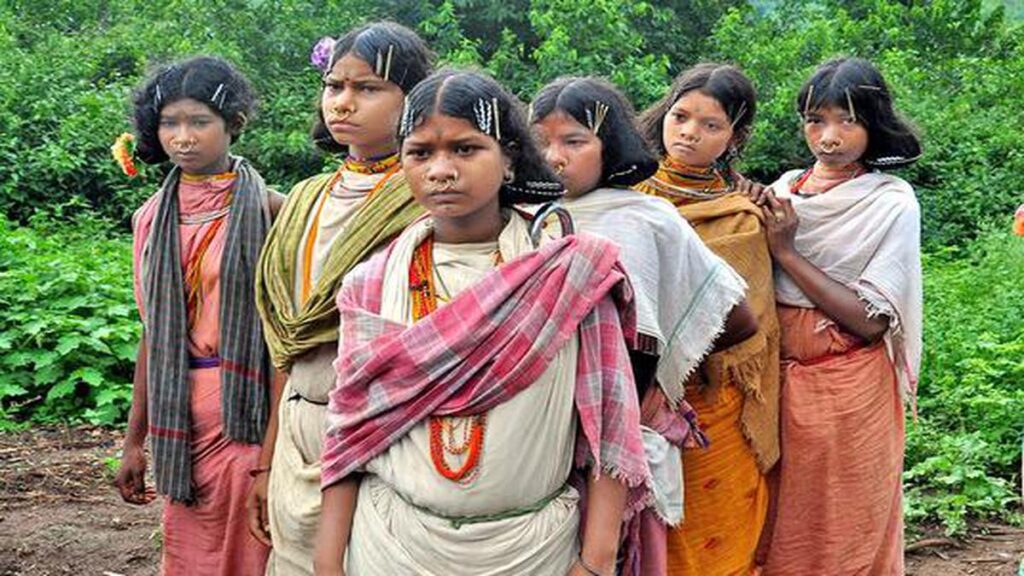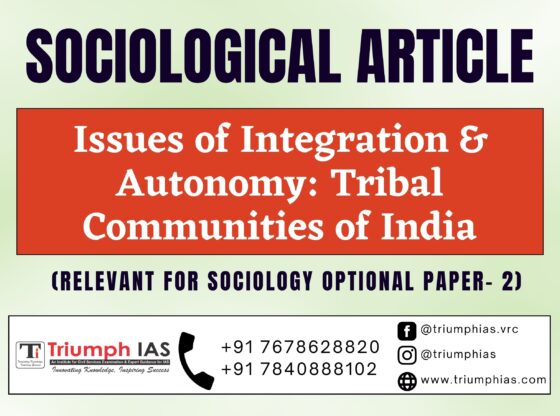Issues of Integration & Autonomy: Tribal Communities of India
Relevant for sociology optional Paper- 2 (Unit- 12 : Social Structure)

The integration and autonomy of tribal communities in India have been a topic of debate and discussion for many years. On the one hand, there is a push to integrate tribal communities into the mainstream society, while on the other hand, there is a need to respect their autonomy and preserve their unique cultural identities. This essay will explore the issues of integration and autonomy of tribal communities in India and the challenges that they face.
The issue of integration of tribal communities into the mainstream society has been a central theme in Indian politics since independence. The Indian government has implemented several policies aimed at integrating tribal communities into the mainstream society. The policies have focused on education, healthcare, and economic development in tribal areas, and have aimed to improve the social and economic status of tribal communities. The policies have also aimed to promote the inclusion of tribal communities in the political system, and to give them a voice in decision-making processes.
However, the integration of tribal communities has not been without its challenges. One of the main challenges is the cultural differences between tribal communities and the mainstream society. Tribal communities have unique cultural identities, which are closely tied to their traditions, customs, and beliefs. The integration policies have often failed to recognize and respect these cultural differences, and have imposed the norms and values of the mainstream society on tribal communities.
The imposition of mainstream cultural norms on tribal communities has often led to the marginalization of these communities. The policies aimed at promoting the education of tribal children, for example, have often failed to recognize the importance of tribal culture and language in the educational process. This has led to a loss of cultural identity and a sense of alienation among tribal children.
Another challenge of integration is the issue of land ownership. The displacement of tribal communities from their traditional lands has been a major issue in India since the colonial era. The Indian government has implemented several policies aimed at resettling tribal communities in designated tribal areas. However, the policies have often failed to recognize the importance of traditional land ownership practices among tribal communities. The policies have also failed to address the issue of land grabbing by non-tribal communities.
The issue of autonomy is closely linked to the issue of integration. Tribal communities have their own unique political and administrative structures, which are based on kinship and communal ties. The Indian government has recognized the importance of these structures, and has implemented several policies aimed at preserving them. The policies have aimed to promote the autonomy of tribal communities, and to give them a voice in decision-making processes.
However, the issue of autonomy has also faced its own set of challenges. One of the main challenges is the issue of governance. The traditional political and administrative structures of tribal communities are often not recognized by the Indian government, and are not integrated into the mainstream administrative system. This has led to a lack of representation of tribal communities in decision-making processes, and has undermined their autonomy.
Another challenge of autonomy is the issue of economic development. Tribal communities have their own unique economic practices, which are closely tied to their traditions and customs. The Indian government has recognized the importance of these practices, and has implemented several policies aimed at promoting them. However, the policies have often failed to address the issue of external exploitation of tribal resources. The policies have also failed to recognize the importance of traditional economic practices in the development process.
In conclusion, the issues of integration and autonomy of tribal communities in India are complex and multifaceted. The Indian government has implemented several policies aimed at integrating tribal communities into the mainstream society, and at promoting their autonomy. However, the policies have often failed to recognize the cultural differences between tribal communities and the mainstream society, and have not addressed the issue of land ownership and external exploitation of tribal resources. It is important for the Indian government to recognize the importance of tribal culture and traditions in the integration process, and to respect the autonomy of tribal communities. The government should also prioritize the issue of land ownership and ensure that tribal communities have the right to own and manage their traditional lands. It is also important for the government to work towards addressing the issue of external exploitation of tribal resources, and to ensure that tribal communities have a say in the development process. This can be achieved through the implementation of policies that promote sustainable development and that respect the economic practices of tribal communities.
For more such free UPSC notes, Articles, News & Views Join our Telegram Channel. https://t.me/triumphias
Click the link below to see the details about the UPSC – Civils courses offered by Triumph IAS. https://triumphias.com/pages-all-courses.php


